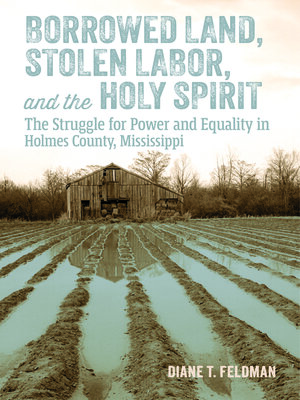Borrowed Land, Stolen Labor, and the Holy Spirit
ebook ∣ The Struggle for Power and Equality in Holmes County, Mississippi
By Diane T. Feldman

Sign up to save your library
With an OverDrive account, you can save your favorite libraries for at-a-glance information about availability. Find out more about OverDrive accounts.
Find this title in Libby, the library reading app by OverDrive.



Search for a digital library with this title
Title found at these libraries:
| Library Name | Distance |
|---|---|
| Loading... |
Borrowed Land, Stolen Labor, and the Holy Spirit: The Struggle for Power and Equality in Holmes County, Mississippi chronicles the profound history of a low-income county that became a pivotal site for Delta organizing during the civil rights movement. Landowning African American farmers, who enjoyed more economic independence than sharecroppers, emerged as the grassroots leaders of the movement.
The volume begins with the county's Native American heritage, moving through the periods of removal, land sales to speculators, the rapid increase of enslaved labor in the nineteenth century, and early African American political engagement during Reconstruction. Author Diane T. Feldman explores how African Americans fostered cooperative landownership efforts in the 1880s and 1920s, alongside the development of schools and churches, particularly the Church of God in Christ, a denomination founded in Holmes County. The fight for voting rights started with African American farmers in the 1950s and gained momentum with the Student Nonviolent Coordinating Committee in the 1960s. Their struggle to desegregate schools culminated in the landmark Supreme Court case Alexander v. Holmes, which abolished dual school systems in the South.
The final chapters cover the past sixty years and current initiatives to restore food production in the Mississippi Delta. Enriched with recent and historic photographs, this volume serves as a microhistory of a single county, illuminating broader themes prevalent throughout Mississippi and the rural South.
The volume begins with the county's Native American heritage, moving through the periods of removal, land sales to speculators, the rapid increase of enslaved labor in the nineteenth century, and early African American political engagement during Reconstruction. Author Diane T. Feldman explores how African Americans fostered cooperative landownership efforts in the 1880s and 1920s, alongside the development of schools and churches, particularly the Church of God in Christ, a denomination founded in Holmes County. The fight for voting rights started with African American farmers in the 1950s and gained momentum with the Student Nonviolent Coordinating Committee in the 1960s. Their struggle to desegregate schools culminated in the landmark Supreme Court case Alexander v. Holmes, which abolished dual school systems in the South.
The final chapters cover the past sixty years and current initiatives to restore food production in the Mississippi Delta. Enriched with recent and historic photographs, this volume serves as a microhistory of a single county, illuminating broader themes prevalent throughout Mississippi and the rural South.







